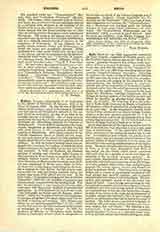

Kellner, LORENZ, educationist, b. at Kalteneber in the district of Eichsfeld, January 29, 1811; d. at Trier, August 18, 1892. He was the son of Heinrich Kellner who had been a pupil of Pestalozzi at Yverdon and had introduced Pestalozzi’s methods at the normal school he conducted, the first of its kind in the Catholic district of Eichsfeld. Out of these private courses for the training of elementary school-teachers developed the still existing seminary for teachers at Heiligenstadt. Lorenz Kellner graduated at the Gymnasium Josephinum at Hildesheim, and then studied with great success at the evangelical seminary for teachers at Magdeburg. After being a teacher at the Catholic elementary school at Erfurt for two years, he was made rector of the school; in both positions he showed great talent for teaching and a genuine love of children. In 1836 his father’s normal school was enlarged into a seminary for teachers, of which the elder Kellner remained the head while Lorenz was made his only assistant. In 1848 von Eichhorn, the Prussian minister of worship and education, called Lorenz to Marienwerder in West Prussia as member of the government district council and of the school board. After laboring at Marienwerder for seven years Kellner was summoned to fill the same offices at Trier. As there were at this date no institutions for the training of teachers in Trier, Kellner founded several seminaries both for male and female teachers during the twenty-nine years of his official activity here. In his chief work, “Praktischer Lehrgang fur den deutschen Unterricht” (1837-40), the teaching of grammar was systematically connected with the readingbook. This was, for that period, a very important advance when contrasted with the current methods of grammatical instruction. In 1850 appeared his best-known work, “Zur Padagogik der Schule and des Hauses. Aphorismen”, which was translated into several languages. It contains altogether 178 essays which cover the entire field of training and teaching. His “Skizzen and Bilder aus der Erziehungsgeschichte” (3 vols. 1862) was the first and also the best treatment of the history of pedagogics by a Catholic author. In 1863 the Academy of Munster in Westphalia made Kellner Doctor of Philosophy honoris causa, in recognition of his services on behalf of the German language and of pedagogics. Kellner’s “Kurze Geschichte der Erziehung and des Unterrichts” (1877) is a book of practical suggestions for teachers; his “Volksschulkunde” was a theoretical and practical guide for Catholic teachers of both sexes, school inspectors, and seminaries. His “Lebensblatter, Erinnerungen aus der Schulwelt” (1891) is a work of great interest. After his death was published “Lose Blatter, Padagog. Zeitbetrachtungen and Ratschlage von Kellner” (1897).
KARL HOEBER

